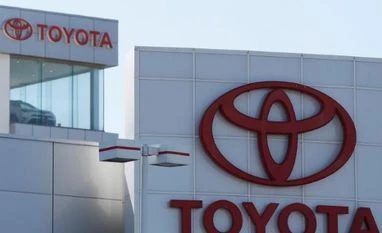Toyota Motor Corp, long opposed to producing its premium Lexus cars in China because of concerns over quality and profitability, is now considering it to ignite growth and narrow sales gaps with its German rivals, four company insiders told Reuters.
The company, which imports Lexus models made in Japan to sell in China, has spent the last two years researching how to produce them locally.
Toyota also talked to its Chinese joint-venture partners - Guangzhou Automobile Group Co and FAW Group - last year about Lexus models. It wasn't clear whether Toyota approached the Chinese companies about a partnership or vice versa.
Local production would be a major shift for the world's largest automaker, encouraged by improved China-Japan ties, as well as new Chinese investment rules that might allow foreign automakers to fully own or majority-control China operations.
"We're torn over this," said one of the insiders.
"But it makes little sense to let this opportunity slip by," another told Reuters.
More From This Section
All four insiders declined to be identified because they are not authorized to speak to the media.
China's planned scrapping of foreign ownership restrictions in the auto industry is in part a response to criticism that Chinese companies have been largely allowed to invest freely in outside markets while Beijing limits foreign firms' access to the world's second-largest economy.
The rule changes - affecting electric carmakers this year and others by 2022 - led Tesla Inc to gain Beijing's approval for a wholly-owned China manufacturing and sales company in Shanghai. That marked the first time a foreign carmaker established itself in China without a partner.
Toyota already produces numerous Toyota-brand models, including the Camry, Highlander, Corolla, Levin and Crown, in China with partners. Last year it sold 1.29 million cars there, including imported Lexuses.
Toyota had contemplated moving Lexus production to China before - as far back as 2011-12, according to one of the four insiders.
But it had until now considered a potential erosion of quality too much of a risk, and didn't want to sacrifice the brand's relatively high margins by sharing profits with a local partner.
Two of the Toyota insiders said the automaker had identified specific scenarios for localizing Lexus.
"All the preparation has been more or less completed," one said. "All we're waiting is a 'go' from management."
TRICKY TIMING
Toyota's preferred option is to own all or most of a localized Lexus unit, which it could do immediately by building only electric cars. (Lexus has plans for electric battery and plug-in electric hybrid versions of existing models.)
But China might not let another brand in when the market has slowed down significantly, with sales of some foreign vehicles, including Groupe PSA, Ford and Hyundai, all falling in the gutter in recent months.
"You'd still need a good political follow-wind to execute this," one of the sources said, pointing to help from Japanese Prime Minister Shinzo Abe, who has a state visit to China planned for this month.
Even as other premium brands - such as Audi, BMW, Mercedes-Benz and Cadillac - have opened assembly plants in China to gain market share, Toyota has resisted.
That reluctance reflects the company's unwillingness to share with a Chinese partner a brand painstakingly built since 1989 into a top premium car in the United States.
Opponents inside Toyota also point to China's lowering tariffs on passenger cars to 15 percent from 25 percent in July as a reason to keep importing Lexuses.
They also note that the nearest Lexus plant to China is at the northern tip of Japan's southernmost main island of Kyushu -only two days from Shanghai by sea.
A Toyota spokesman in Tokyo said "the most important task" for Lexus is to become a distinguished brand in China.
"We always weigh the need for localizing production as part of the consideration for the Lexus brand's future in China," he said. "But at this point in time, we don't have any specific plans for producing Lexus cars in China."
Nonetheless, support for localization is growing among Toyota leaders.
China has typically been a difficult market for Japanese companies, but there is new optimism, especially after an official visit to Japan by Chinese Premier Li Keqiang in May.
During his visit, Li toured Toyota facilities on the northern island of Hokkaido, escorted by the company's family scion and chief executive, Akio Toyoda.
Toyoda has since sought to boost his company's presence in China, including an effort to significantly expand its manufacturing capacity and distribution networks, and share more technologies with Chinese companies.
NEED FOR SPEED
China has also proposed limiting new production capacity for automakers, adding an incentive for Toyota to move quickly if it wants to build Lexus models there.
Nissan Motor Co and Toyota have each recently revealed plans to boost capacity, much of which will be used to produce electric cars.
Alan Kang, a Shanghai-based analyst for consultancy LMC Automotive, thinks localizing production is exactly what Lexus needs to start narrowing the big sales gap with German premium brands.
Mercedes-Benz, for example, last year sold about 610,000 vehicles, compared to 130,000 for Lexus during the same year, according to LMC.
"If Lexus doesn't want to remain a niche, it needs to start investing more," Kang said.
)